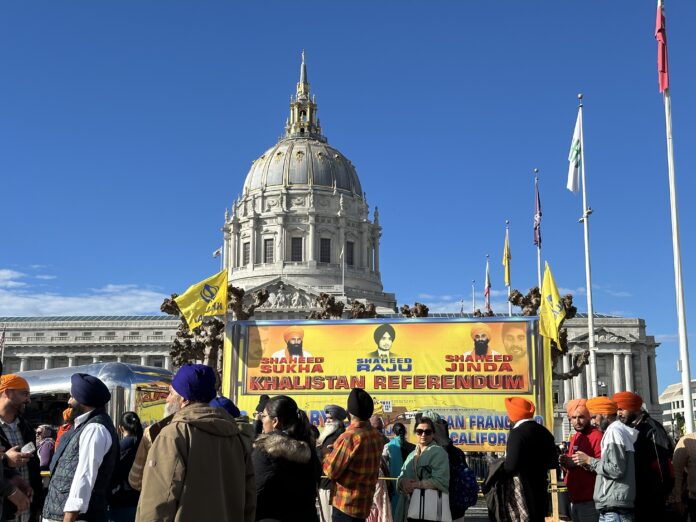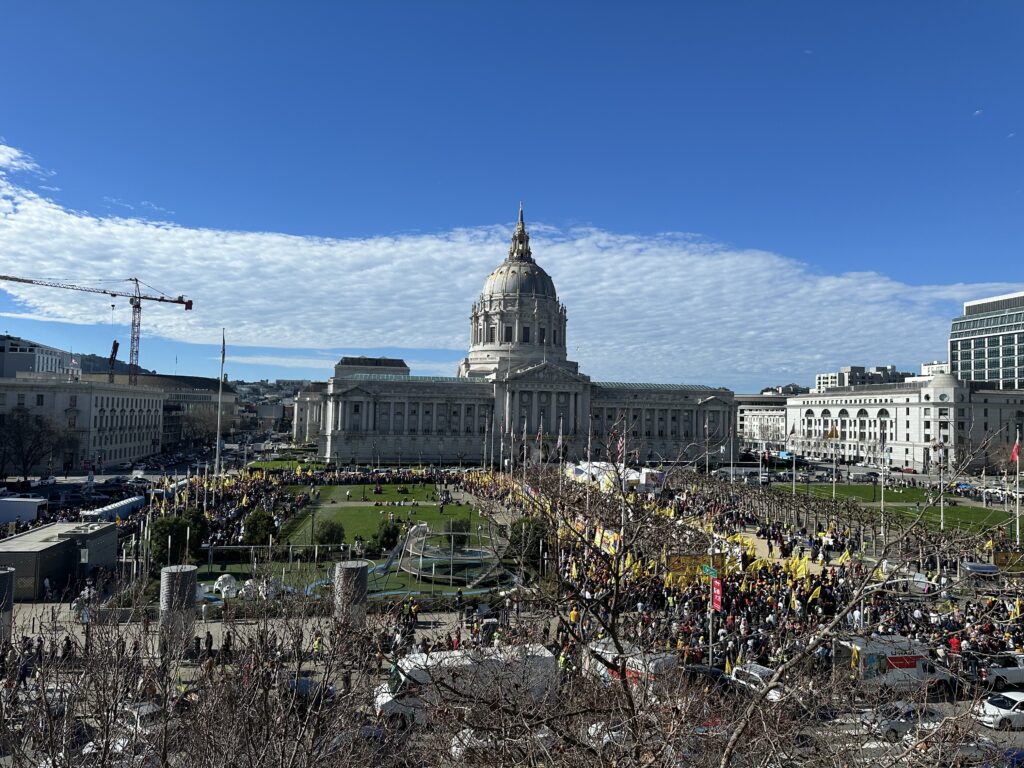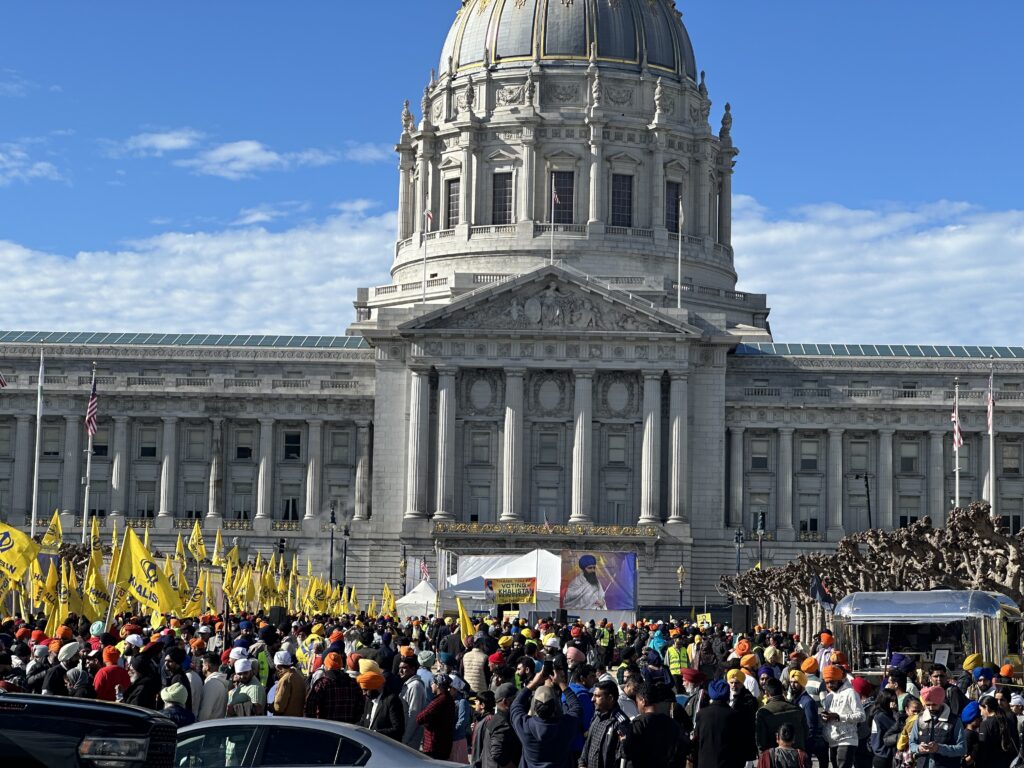By Akemi Tamanaha, Associate Editor
On Sunday, over 125,000 Sikhs gathered at San Francisco’s Civic Center Plaza for a referendum on Sikh independence. It is the first referendum of its kind in the United States.
The vote, known as “The Khalistan Referendum,” calls for an independent Sikh state (Khalistan) in Punjab, a northern state in India. It is part of a broader independence movement dating back to the 1930s.
A group called Sikhs for Justice began organizing the referendum in 2021 and held its first vote in London on October 31, 2021. Referendums have been held in Canada, Australia and other places with large Sikh populations.
The Sikh Coalition estimates that there are more than 500,000 Sikh Americans in the United States. According to the Fresno Bee, 250,000 live in California alone. The Sikh Press Association announced Sunday evening that upwards of 125,000 Sikhs came to San Francisco to vote.
Voting began around 9:00 a.m. Thousands of Sikh Americans bused from other locations in the Central Valley and the Bay Area to attend. Karam Singh, a member of the California Sikh Youth Alliance, left Sacramento around 6:00 a.m. to arrive in San Francisco right at the start.
Singh’s parents were political asylees and his family members faced persecution in India.
“It’s very special for me to cast a ballot and to speak for them, the people that we’ve lost to the movement, as well as folks who continue to be persecuted,” Singh told AsAmNews.
In 1984, the Indian government- spurred by acts of retaliatory violence from Sikh militants who were frustrated by India’s repressive rule- deployed troops to Punjab to eliminate Sikh extremists. The result, according to the Sikh Research Institute, was the death of 30,000 Sikhs and the displacement of another 300,000.
Singh says many of the Sikhs attending Sunday’s referendum fled violence and persecution in India during the 1980s and 1990s.
“They feel the pain of the Sikh genocide, like really, like it’s a really special feeling for them, right, because they’ve experienced the violence,” Singh said.
Sikh activists believe the referendums are particularly important given the rise of Hindu nationalism in India under Prime Minister Narendra Modi. A little over a week ago, Modi and many influential Indian leaders celebrated the opening of a new Hindu temple called Ram Mandir. According to Vox, the temple was built on the site of an ancient mosque, which was torn down by a Hindu mob in the 1990s.
Advocates fear what the nationalistic turn could mean for the millions of Sikhs, Muslims, Christians, Dalits and other non-Hindus living in India.
Anti-Sikh sentiment and violence are moving beyond India’s borders. On June 18, 2023, Hardeep Singh Nijjar, an activist and independence advocate, was shot and killed in the parking lot of the Guru Nanak Sikh Gurdwara in Surrey, Canada. Sikh independence advocates and their allies say the shooting was an assassination. In September, Canadian Prime Minister Justin Trudeau formally accused India of being involved with Nijjar’s death.
Nijjar was killed two months before The Khalistan Referendum was held in Surrey on September 10. Two young Sikh women who knew Nijjar told AsAmNews that they traveled to San Francisco from Surrey to honor his commitment to Sikh independence.
“For him, we decided to travel to countries that he’s not able to travel to for the referendum that he was advocating for,” one of the young women said.
“It’s quite motivational for us. And we’re so lucky to be surrounded in an environment and between our families, that they’re willing to come out and fly with us to like, to referendums like this,” she added.
Sikh leaders in the U.S. are also under threat. In December, the FBI revealed it believed India was involved in a failed attempt to assassinate Sikh American lawyer Gurpatwant Singh Pannun. In an exclusive interview with the Fresno Bee last week, Pannun he would attend the vote.
“This issue is not about threats to my life or an assassination attempt,” Pannun said. “This is about the existential threat that the Sikh community is facing under successive Indian regimes.”
He spoke to the crowds in San Francisco on Sunday.
The referendums being held outside of India are non-binding, meaning technically they cannot officially require India to create Khalistan. The results are being tabulated by The Punjab Referendum Commission, an independent commission made up of direct democracy and legal experts. The commission will help gauge how much support the movement has before it can be brought before other major legal bodies like the United Nations.
India has refused to acknowledge the referendums so far, but advocates hope the continued support will force the government’s hands. Referendum organizers say the goal is to eventually hold a binding referendum in Punjab.
For now, the referendums are away for the Sikh diaspora to support their loved ones back in India.
“They’re sort of becoming the voice for the voiceless,” Singh said. “A lot of people in Punjab, they can’t speak out against the government, because they fear persecution. So I think the people out here are just here in sort of solidarity with the folks who face persecution.”
AsAmNews is published by the non-profit, Asian American Media Inc.
We’re now on BlueSky. You can now keep up with the latest AAPI news there and on Instagram, TikTok, Facebook, YouTube and X.
We are supported by generous donations from our readers and by such charitable foundations as the Robert Wood Johnson Foundation.
You can make your tax-deductible donations here via credit card, debit card, Apple Pay, Google Pay, PayPal and Venmo. Stock donations and donations via DAFs are also welcomed.






